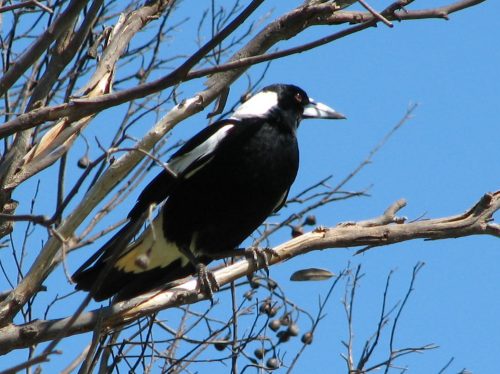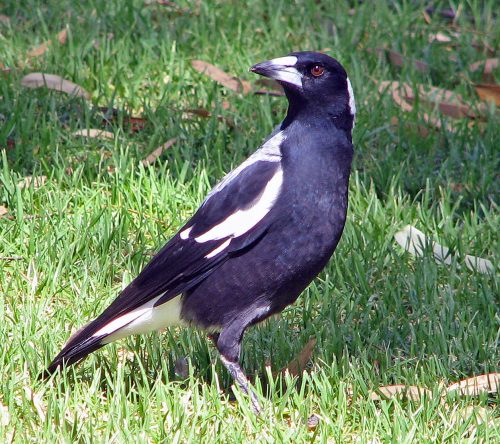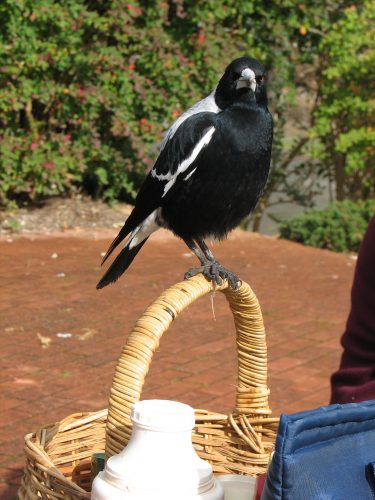Reflections on an old story

Australian Magpie
Memory lane
I have been having a trip down memory lane in recent days. I have been typing up an old story I wrote many years ago. In fact, the only copy I appear to have is a typed copy with 1989 on the title page. I was shocked to realise that this story was written nearly 28 years ago. It has languished ever since as one or two copies stored in boxes in our garage. The copy I am using was printed on an old dot-matrix printer. Remember those old clunkers?
Early computers
This story, called Magpie Farm (hence the photo of an Australian Magpies above and below), was typed on either a borrowed Commodore 64 computer or on the Amigo 500 I bought around that time. I can’t remember. I think that it was written during a school holiday break; I was a classroom teacher at the time. Those old computers were wonderful, and I learned so many things about the digital world from them. I still have the old Amiga – in working condition too, though I only fire it up every five years or so. Sadly, the old Amiga discs are not compatible with today’s PCs, hence the need to retype this story.
First novel
I am sure that this was my first attempt at writing a novel for children. At just under 10,000 words it is probably better described as a chapter book. I have since written several more novels for children, of varying lengths and subject matter. I am planning to prepare these for publication sometime this year. They will initially be in eBook format with print on demand paper copies also available.
Background to Magpie Farm
As I type up this story, I recognise many incidents from real life. The main character is a young boy who is afraid of magpies. Some Australian Magpies are notorious for their tendency to swoop people during the breeding season. The boy’s family move to a small farm and he is horrified that there are magpies on the farm. Some of the incidents I have included in the story are drawn directly from my own family’s experiences. A few years before writing this story, we also bought some acreage, though five acres (two hectares) can hardly be called a “farm”. We did have some sheep for a while; I’m not sure if that qualifies it as being a farm.
A problem
I have a serious problem with the story. Several problems, actually.
It is terrible.
Honestly – it needs some serious editing, rewriting and restructuring. The problem is that I have decided to be very strong as I type it up. I tend to edit as I type. This applies to most of my writing these days. The first draft is often very close to the final draft. I rewrite, edit, proofread and so on as I go. Not always, but usually that is my preferred writing style. This time I decided to be very strong and resist all urges to stop and rewrite, edit or change anything. Those steps will come later.
Why is it terrible?
As I type, I find myself wincing often. How could I have written such terrible prose? The dialogue between characters is not all that bad, but the rest of it is quite naive – almost childish. This shows up three basic things:
- I have certainly progressed a long, long way as a writer in the intervening years.
- There is much good material in the story which can be vastly improved.
- I now know what is wrong with the story and the writing, and how to fix it; that comes with experience and heaps of writing practice (over 3 million words later, and counting).
Where to now?
I still have a few chapters to type up. Then I will spend a week or two rewriting whole slabs of the text to bring it up to publishable standards. Later will come the proofreading and copy editing stages before I send my baby out into the world. After that, I have two other longer novels written several years later and they will both need the same treatment.
Is it all worth it?
If the story as it stands now is so terrible in my own eyes, is it worth pursuing and putting in all that work? I believe so. I take this attitude, not because it was my first serious attempt at a novel, but because of feedback from readers.
- At the time I printed out a number of copies and handed them out to friends. They all commented how good it was, and how much they enjoyed it.
- I also read it to several classes I was teaching at the time of writing. I still have contact with many former students who remember the story well.
- I was asked recently by one former student if I had published this story. He added that it had a profound, positive effect on him. It inspired him to become a writer. He has published some of his writing, he has participated successfully in performance poetry events, and he wrote and performed in a musical which was showcased last week at the Adelaide Fringe Festival. This festival is regarded worldwide as second only to the Edinburgh Fringe Festival.
- Wow! I love feedback like that.
Stay tuned
I plan to publish this chapter book (novel?) in the near future, so stay tuned. The launch will be announced on this site, and it will be available through this site.
Good reading. Good writing.
Trevor
Further reading:
- Trevor’s Birding – check out another blog of mine where I also write regularly about Australian birds. I showcase many of my bird photos on that site.

Australian Magpie

Australian Magpie
What is the hardest part about writing?
I was chatting to friend Sue earlier this week and she posed the following question:
“What do you think is the hardest part of any major creative project? For me and for my writing it is starting. Taking that leap of faith that your idea will work and that it is worth investing your time and energy into.” Sue Jeffrey
I’d have to agree that starting can be very daunting. It’s a bit like starting a train rolling, taking off in a plane or a moving large vehicle of any kind. Most of the energy is expended in starting. Once moving, the energy needed to keep going is vastly reduced.
Writing is very similar, but once started I find that the story builds its own momentum and carries me along with it. That’s exciting, and momentum builds its own form of energy and sustains the forward movement. I have found that to be true when writing my most recent work, a novel for children. I struggled to get the first few chapters going, but once I was several chapters into the story, it developed its own momentum, building up a head of steam that kept the wheels of my locomotive turning faster and faster until the destination was reached.
One of the interesting observations from all those who have read the whole book, including my examiners for my MA, is that the latter two thirds of the novel are far stronger than the beginning, with the exception of the first chapter. I’d agree because once I’d built that momentum the writing became progressively easier. That first chapter went through many revisions and major rewrites, so no wonder it is good.
Harder yet
While I agreed with Sue that starting a new writing project is hard, I find that rewriting and editing can often be the hardest part for me. Once I get under way I find that the story often carries me along, an enjoyable place to be. I just sit back, relax and enjoy the ride. Yes, sometimes the ride can get a little bumpy, but the thrill of discovering what happens – even when I have a strong plan and outline – outweighs any periods of momentary discomfort.
I find the necessary stages of rewriting, editing and proofreading to be tedious, mind numbing and even boring at times. I know what happens, I know the characters and I want to leave them and start something else – to go on a new adventure.
STOP.
These latter stages are terribly important, especially if one wants to see the story published. During my degree I learned to not only appreciate this vital process, but I also realised how creative editing and rewriting can be. The finished creative work is much better, stronger and publishable than that rough gemstone we call our first draft.
Still harder yet
There are three even harder elements to the creative process like writing a novel or story.
- Deciding when the story is polished enough to send to a publisher.
- Deciding where to send the story.
- Waiting for a reply.
The best thing is just to get on with writing the next story or novel.
If you can only get started.
Good writing.
Further reading:
Seven things I have learned while doing my degree
I received a phone call from my supervising lecturer yesterday with the good news that I’ve passed my Master of Arts (Creative Writing) degree.
And with a Distinction, too.
After three years of intensive, hard and sometimes frustrating work, I finally get to wear the funny hat and gown in a few months’ time. It has been a difficult and testing time, but there have been many highlights and fun times in there as well. My final thesis paper was a 40,000 word novel for children plus a 10,000 word exegesis essay on the research, influences and processes of writing. You can read more about the process in a series of articles here. Now I start the next phase in the process; trying to find a publisher to give my precious novel a good home. This could prove to be the hardest part of all.
So what have I learned?
Doing my degree has taught me some valuable lessons:
- Writers can always improve: no matter how much you think you know about writing, you can always get better.
- Writing is hard work: I have put in literally thousands of hours of writing, rewriting, editing and proofreading into my essays, assignments and novel.
- Writers need persistence: I must admit there were times when I almost gave up, when the task seemed too much or health issues intervened. By persisting I was able to finish the race.
- Writers learn to write by writing: there is no other way. Write, write, write – and your writing skills will develop.
- Rewriting is as important as writing the first draft: too often I have been satisfied with the attitude my first or second draft of a story or poem. Most first drafts are rubbish. My novel went through an incredible 17 drafts before I was truly happy with it.
- Editing is a part of the creative process: I used to hate editing my stories. I found it tedious and boring. I wanted to be rid of the story and to get on with the next one. Editing is an essential part of the writing process; ignore this stage and your writing will remain mediocre – and unpublished. I still don’t love editing, but I have come to appreciate its importance.
- Proofreading is an essential writing skill: editors and publishers are almost unanimous in their chief gripes about writers, and this one is almost always near the top of their list. If you don’t proofread your writing before sending it off to a publisher you stand a very poor chance of having the work published.
I could go on, but these seven things stand out. I probably could add patience too, because that lesson is still coming. Sure, I have had to wait a long time to get my final results, but the wait to hear from a publisher is sure to be much longer, and then the wait to hold the book in my hands may be even longer. But as they say, good things come to those who wait.
And if patience is a virtue, then I must be very virtuous.
Good writing.
Further reading:
